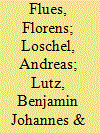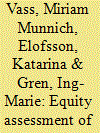| Srl | Item |
| 1 |
ID:
137266


|
|
|
|
|
| Summary/Abstract |
For many years, the EU pursued the strategy of ‘leading by example’ in international climate negotiations. Climate policy has generally been seen as one of the few policy fields in which the EU is able to develop coherent positions and speak with a single voice. Since the Copenhagen climate summit, however, frictions inside the EU and a paradigm shift have become increasingly evident. With the October 2014 compromise in the European Council on a new framework for 2030, the international climate negotiations have become less important and a more incremental domestic approach has prevailed.
|
|
|
|
|
|
|
|
|
|
|
|
|
|
|
|
| 2 |
ID:
136203


|
|
|
|
|
| Summary/Abstract |
The European Union׳s current climate and energy policy has to operate under an ex ante unforeseen economic crisis. As a consequence prices for carbon emission allowances in the EU Emissions Trading System collapsed. However, this price collapse may be amplified by the interaction of a carbon emission cap with supplementary policy targets such as minimum shares for renewables in the power sector. The static interaction between climate and renewable policies has been discussed extensively. This paper extends this debate by analysing the efficiency and effectiveness of a policy portfolio containing a cap and trade scheme and a target for a minimum renewable share in different states of aggregate electricity demand. Making use of a simple partial equilibrium model of the power sector we identify an asymmetric interaction of emissions trading and renewable quotas with respect to different states of aggregate electricity demand. The results imply that unintended consequences of the policy interaction may be particularly severe and costly when aggregate electricity demand is low and that carbon prices are more sensitive to changes in economic activity if they are applied in combination with renewable energy targets. Our analysis of the policy interaction focuses on the EU, yet the conclusions may also be of relevance for fast growing emerging economies like China.
|
|
|
|
|
|
|
|
|
|
|
|
|
|
|
|
| 3 |
ID:
119780


|
|
|
|
|
| Publication |
2013.
|
| Summary/Abstract |
This research investigates if the stringent 2020 and 2050 overarching CO2 mitigation objectives set out by the European Union dominate its 2010 to 2020 targets specific to the transportation arena, specifically its biofuel penetration objectives and gram CO2per kilometre emission caps. Using a dynamic recursive general equilibrium model, IMACLIM-R, we demonstrate that these overarching targets do not dominate the interim transportation targets when the carbon policy triggering compliance with the mitigation objectives boils down to the theoretical least-cost option of uniform carbon pricing. Ground transportation is confirmed as quite insensitive to high carbon prices, even when such prices are applied over a long term. It is tempting to conclude that pursuing the mitigation objectives specific to transportation will impose unnecessary costs. However, because of the second best conditions prevailing in actual economies, and of the risk of lock-in in carbon intensive trajectories, we conclude with the urgent need for some ambitious transport-specific policy design research agenda.
|
|
|
|
|
|
|
|
|
|
|
|
|
|
|
|
| 4 |
ID:
191231


|
|
|
|
|
| Summary/Abstract |
Civil society plays an important role in European energy and climate policymaking. This paper poses the questions of how organized civil society handled the opportunities and challenges presented by the lockdown to its access to the climate and energy policymaking within the European Commission (EC)? How has the balance between organized civil society groups and businesses in Europe been affected by pandemic-related travel restrictions? Moreover, what role has the EC played in creating such opportunities and affecting the legitimacy of democratic policymaking? This research sheds light on the changing role of the EC in democratic governance and policy formation in the European Union (EU) by examining the relationship between funding received by CSOs active in the policy areas of environment and climate, the number of meetings attended, and the importance of coalitions and networks. This research revealed a possible relationship between level of participation in policymaking and the operational support received from the EC. Despite the resources invested, opportunities for interest representation in the energy and climate policy areas disproportionately favor businesses and organizations with long-term relationships with and proximity to Brussels. Increased number of virtual meetings only marginally increased share of participation of NGOs in these meetings. Thus, a physical presence in Brussels and resource investment remain important factors in access to the EU policymaking.
|
|
|
|
|
|
|
|
|
|
|
|
|
|
|
|
| 5 |
ID:
125662


|
|
|
|
|
| Publication |
2013.
|
| Summary/Abstract |
Large emissions of greenhouse gases are expected to cause major environmental problems in the future. European policy makers have therefore declared that they aim to implement cost-efficient and fair policies to reduce carbon emissions. The purpose of this paper is to assess whether the cost of the EU policies for 2020 can be reduced through the inclusion of carbon sequestration as an abatement option while equity is also improved. The assessment is done by numerical calculations using a chance-constrained partial equilibrium model of the EU Emissions Trading Scheme and national effort-sharing targets, where forest sequestration is introduced as an uncertain abatement option. Fairness is evaluated by calculation of Gini-coefficients for six equity criteria to policy outcomes. The estimated Gini-coefficients range between 0.11 and 0.32 for the current policy, between 0.16 and 0.66 if sequestration is included and treated as certain, and between 0.19 and 0.38 when uncertainty about sequestration is taken into account and policy-makers wish to meet targets with at least 90 per cent probability. The results show that fairness is reduced when sequestration is included and that the impact is larger when sequestration is treated as certain.
|
|
|
|
|
|
|
|
|
|
|
|
|
|
|
|
| 6 |
ID:
118824


|
|
|
|
|
| Publication |
2013.
|
| Summary/Abstract |
Carbon capture and storage (CCS) on electricity generation and energy intensive industry is expected to play a considerable role in achieving the European Union's decarbonisation goals. EU CCS demonstration project funding has been created to encourage development and accelerate commercial CCS deployment by providing funds to bridge the capital gap for early commercial-scale CCS installation. Eleven CCS project proposals currently remain at least nominally active, but reduced funding and other constraints suggest at best delivery of around a third of these. To explore how these demonstrations impact on the scale of subsequent CCS deployment in the EU three simple scenarios for post-demonstration CCS activity and deployment (none, limited and considerable) are considered and examined in the context of key factors that have influenced the demonstration programme. Without strong political support for post-demonstration deployment including measures such as strategic storage validation and CO2 pipeline planning, and a clear process to make CCS commercially attractive to investors on a timeline consistent with climate ambitions, even a positive result from the demonstration programme is unlikely to enable CCS to deliver as expected.
|
|
|
|
|
|
|
|
|
|
|
|
|
|
|
|